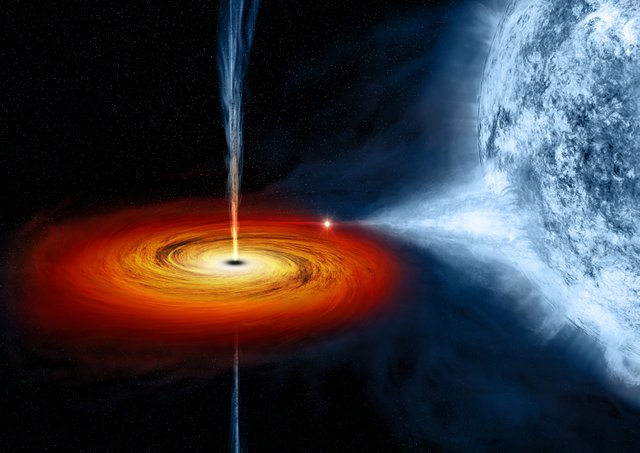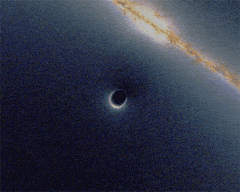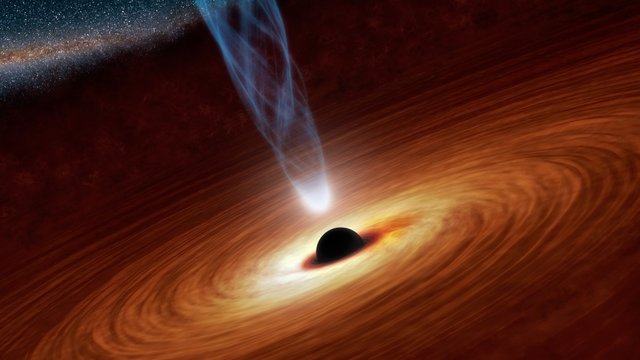Black holes, the power of infinity
Black holes were a possibility predicted by Einstein back in the 1950s, he could not accept that they existed. We have proven them and studied them.

( source )
Black holes, the area of no return
Black holes are the last step in the life cycle of some giant stars. This can happen for multiple reasons, but most end in an explosion.
Iron, the bane of stars
The most common reason is supergaint stars start fusing iron, which starts to happen at 25 stellar masses. A stellar mass is the mass of our sun which is about 1.989 x 10^30 kilograms. A star is in a constant struggle against gravity, it must produce energy to keep itself from collapsing. First hydrogen is fused in its center, then helium, magnesium all the way up to iron. Until it gets to iron fusing produces energy. Fusing iron takes energy, which means the stars death. The star collapses because it can not sustain its outward force. The core collapses on itself first, then the outer layers collapse in, and bounce off. This is likely because the outer layers have a large amount of unused fuel that fuses all at once. This then explodes outward in what is known as a supernovae. The center can become a black hole, although this depends on the mass of the star and the conditions of the core at the time.
The properties of black holes
Black holes have unique properties compared to most large structures of the universe. Black holes are so dense and have such strong gravity that light can't even escape. This is because gravity literally warps space, the black hole keep warping it quicker than light and infinitely "deep'. It is literally a 3 dimensional hole.

( source)
Black holes have something called an "event horizon", the event horizon is the the point where light can not escape a black hole. We know of no particles that can travel faster than light which means it is literally the point of no return. When you go in you get drawn to the singularity which is an infinitely dense point. It will rip you apart and slowly kill you as you get closer. Once you pass the event horizon you are dead.
Escape from a black hole
Escape is possible, in a way. Information can not be lost, which means something must come out of a black hole. Well Steven Hawking thought up a loop hole, matter that doesn't go in.
The event horizon of a black hole is a strange place. Imagine a pair of particles popping up on or near the edge of a black hole. One could escape into space while the other would never be able to leave. The black hole would then slowly radiate away. It may have already been proven as well. If the particles are quantum entangled with the black hole (or pieces of it) no information would be lost. (Entanglement is when a particle interacts with another and when observed one will have the opposite of a few or of a certain set of characteristics including spin and momentum.)
Where do they live?
Black holes exist in many different places. The most notable is the center of a galaxy. Every galaxy has one at their center. This one can become a quasar. One of the brightest things in the universe, when large amounts of matter fall into it they get smashed together and heat up as they get closer, producing x-rays and gamma rays in bursts that can outshine their entire galaxy. They help hold together the entire galaxy and can have a mass of a billion suns. They do not really move beyond the middle of the galaxy. Stellar mass ones are more dangerous however, they are created more often near the middle of galaxies as more stars are formed there. (Because it is more dense and stars collide more often etc.) Many do exist in interstellar space. The only way we could know it was coming is if we mapped the area beforehand and saw a small warp of light. Then as it got closer gravity would start to mess with our solar system. Next it would wreck havoc and through planets out of orbit or even the solar system entirely.
We have no idea how common that scenario is but unless we expand past our solar system it is unavoidable. So just don't think about your looming death.

( source )
The beginning of the universe
It is entirely possible the beginning of the universe had a large amount of black holes, some of which may still be alive today. They are called primordial black holes and were most likely formed out of pure energy during the first second of the big bang. Most would have dissipated or melded in with others to become a supermassive one long ago. Few are left, but they could destroy a large city to the entire planet if they hit us. The only way to avoid an entire destruction of humanity is to spread out.
This is all.
If you want to learn more about space subscribe!
Niceee, followed, You write about my favourites topics ever :)
Thanks man, feel free to give me suggestions on what you want me to write in the future!
How about planets that can possibly support life, mysterious galaxies or stars, or about Europa (Jupiter's moon rumored to have life beneath its ocean of ice).
That's a good idea I will probably do that within the next few days! Thanks.
I have always loved black holes ever since I was a kid watching the obscure Disney sci-fi movie, Black Hole. It made me wonder if they were wormholes to other universes, then Steven Hawking came along and ruined that dream.
I have upvoted this piece and will feature this on mu hidden gems post. Awesome content about the colossal giants of the universe.
Thanks man, they still can be linked to each other and still may have miniature universes inside of them. We just need to learn more.
This post has been linked to from another place on Steem.
Learn more about linkback bot v0.4. Upvote if you want the bot to continue posting linkbacks for your posts. Flag if otherwise.
Built by @ontofractal